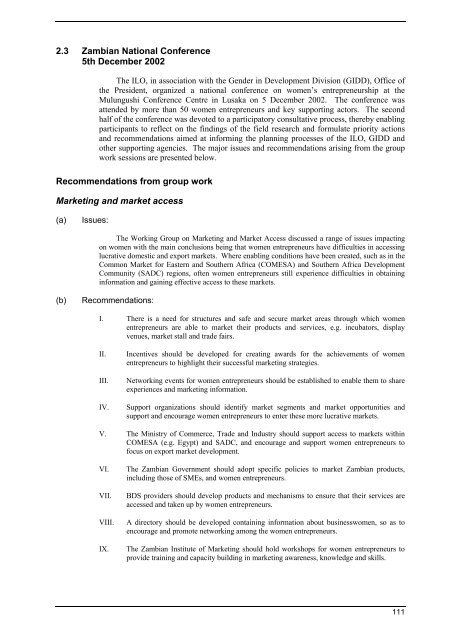The Challenges of Growing Small Businesses - International Labour ...
The Challenges of Growing Small Businesses - International Labour ...
The Challenges of Growing Small Businesses - International Labour ...
You also want an ePaper? Increase the reach of your titles
YUMPU automatically turns print PDFs into web optimized ePapers that Google loves.
2.3 Zambian National Conference<br />
5th December 2002<br />
<strong>The</strong> ILO, in association with the Gender in Development Division (GIDD), Office <strong>of</strong><br />
the President, organized a national conference on women’s entrepreneurship at the<br />
Mulungushi Conference Centre in Lusaka on 5 December 2002. <strong>The</strong> conference was<br />
attended by more than 50 women entrepreneurs and key supporting actors. <strong>The</strong> second<br />
half <strong>of</strong> the conference was devoted to a participatory consultative process, thereby enabling<br />
participants to reflect on the findings <strong>of</strong> the field research and formulate priority actions<br />
and recommendations aimed at informing the planning processes <strong>of</strong> the ILO, GIDD and<br />
other supporting agencies. <strong>The</strong> major issues and recommendations arising from the group<br />
work sessions are presented below.<br />
Recommendations from group work<br />
Marketing and market access<br />
(a)<br />
Issues:<br />
<strong>The</strong> Working Group on Marketing and Market Access discussed a range <strong>of</strong> issues impacting<br />
on women with the main conclusions being that women entrepreneurs have difficulties in accessing<br />
lucrative domestic and export markets. Where enabling conditions have been created, such as in the<br />
Common Market for Eastern and Southern Africa (COMESA) and Southern Africa Development<br />
Community (SADC) regions, <strong>of</strong>ten women entrepreneurs still experience difficulties in obtaining<br />
information and gaining effective access to these markets.<br />
(b)<br />
Recommendations:<br />
I. <strong>The</strong>re is a need for structures and safe and secure market areas through which women<br />
entrepreneurs are able to market their products and services, e.g. incubators, display<br />
venues, market stall and trade fairs.<br />
II.<br />
III.<br />
IV.<br />
Incentives should be developed for creating awards for the achievements <strong>of</strong> women<br />
entrepreneurs to highlight their successful marketing strategies.<br />
Networking events for women entrepreneurs should be established to enable them to share<br />
experiences and marketing information.<br />
Support organizations should identify market segments and market opportunities and<br />
support and encourage women entrepreneurs to enter these more lucrative markets.<br />
V. <strong>The</strong> Ministry <strong>of</strong> Commerce, Trade and Industry should support access to markets within<br />
COMESA (e.g. Egypt) and SADC, and encourage and support women entrepreneurs to<br />
focus on export market development.<br />
VI.<br />
VII.<br />
VIII.<br />
IX.<br />
<strong>The</strong> Zambian Government should adopt specific policies to market Zambian products,<br />
including those <strong>of</strong> SMEs, and women entrepreneurs.<br />
BDS providers should develop products and mechanisms to ensure that their services are<br />
accessed and taken up by women entrepreneurs.<br />
A directory should be developed containing information about businesswomen, so as to<br />
encourage and promote networking among the women entrepreneurs.<br />
<strong>The</strong> Zambian Institute <strong>of</strong> Marketing should hold workshops for women entrepreneurs to<br />
provide training and capacity building in marketing awareness, knowledge and skills.<br />
111
















